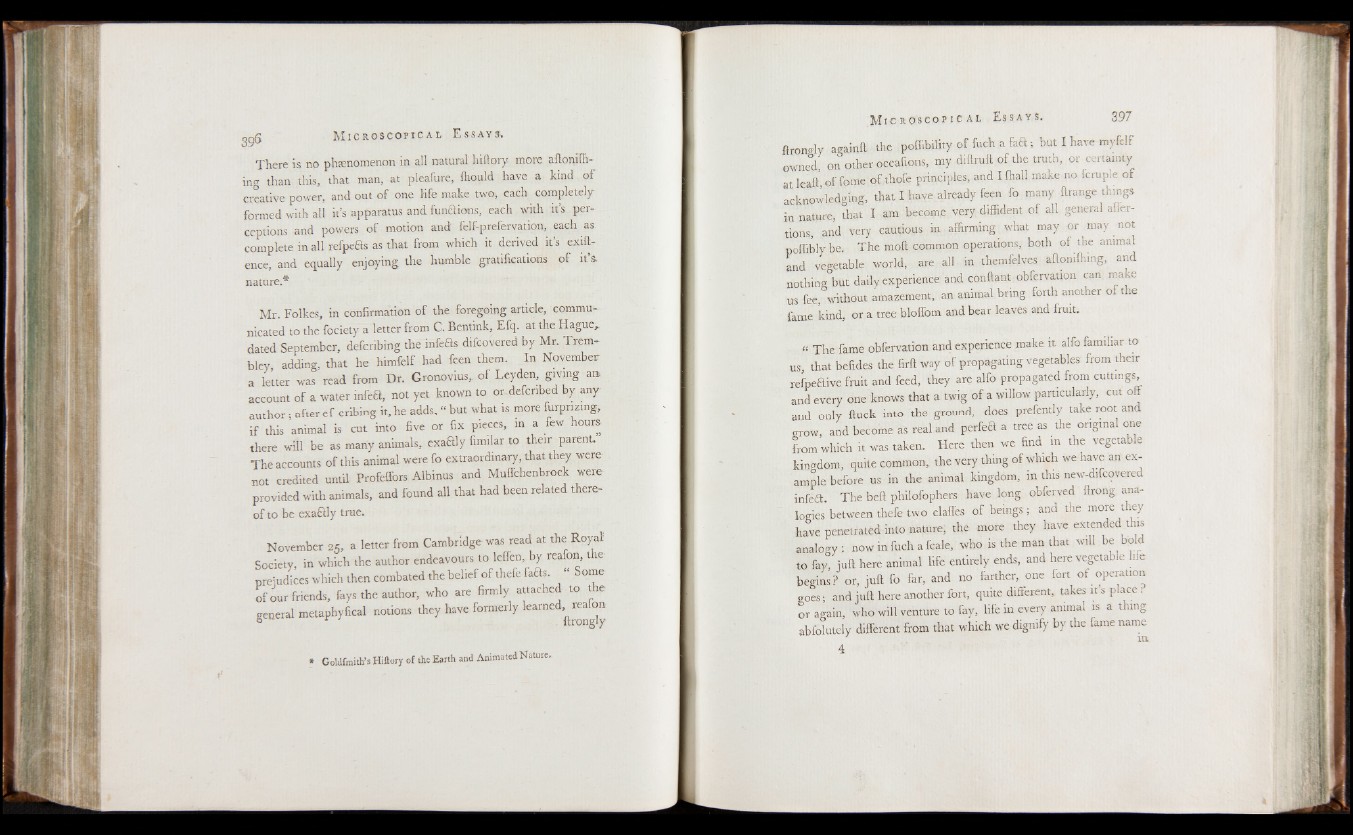
There is no phænomenon in all natural hiftory more aftoniffi-
ing than this, that man, at pleafure, lhould have a kind of
creative power, and out o f one life make twoj each completely
formed with all it’s apparatus and funffions, each with it’s perceptions
and powers o f motion and felf-prefervation, each as.
complete in all refpefts as that from which it derived it’s e x ig ence,
and equally enjoying the humble gratifications o f it’s
nature.*
Mr. Folkes, in confirmation of the foregoing article, communicated
to the fociety a letter from C. Bentink, Efq. at the Hague»
dated September, defcribing the infe&s difcovered by Mr. Trem-
bley, adding, that he himfelf had feen them. In November
a letter was read from Dr. Gronovius, of Leyden giving an,
account of a water infeft, not yet known to or defcnbed by any
author • after e f cribing it,he adds, “ but what is more furpnzmg,
i f this animal is cut into five or fix pieces, m a few hours
there will be as many animals, exaffly fimilar to their parent.
The accounts of this animal were fo extraordinary, that they were
not credited until Profeflbrs Albinus and Muffchenbrock were-
provided with animals, and found all that had been related thereof
to be exaftly true.
November 25, a letter from Cambridge was read at the Royal
Society, in which the author endeavours to lelfen, by reafon, the-
prejudices which then combated the belief of thefe faHs. “ Some
of our friends, fays the author, who are firmly attached to t e
general metaphyfical notions they have formerly learned, rea on
Goldfmith’s Hiftory of the Earth and AnimatedNature.
ftrongly againft the poff.bility of fuch a fa ft; but I have myfelf
owned, on other occafions, my diltruft of the truth, or certainty
at leall of fome of thole principles, and Ilhall make no fcruple o f
acknowledging, that I have already feen fo many ftrange things
in nature, that I am become, very diffident o f all general affer-
tions, and very cautious in affirming what may or may not
poffibly be. T h e moft common operations, both o f the animat
and vegetable world, are all in themfelves aftomffimg, and
nothing but daily experience and conftant obfervation can make
us fee, without amazement, an animal bring forth another o f the
fame kind, or a tree bloffom and bear leaves and fruit.
« The fame obfervation and experience make it alfo familiar to
US, that befides the firft way of propagating vegetables from their
refpeaive fruit and feed, they are alfo propagated from cuttings,
and every one knows that a twig o f a willow particularly, cut off
and only ftuck into the ground, does prefently take root and
grow, and become as real and perfeH a tree as the original one
from which it was taken. Here then we find m the vegetable
kingdom, quite common, the very thing o f which we have an example
before us in the animal kingdom, in this new-difcovered
infea . The belt philofophers have long obferved ftrong analogies
between thefe two elaffes o f beings; and the more they
have penetrated into nature, the more they have extended this
analogy: now in fuch a fcale, who is the man that will be bold
to fay, juft here animal life entirely ends, and here vegetable life
begins? or, juft fo far, and no farther, one fort of operation
goes; and juft here another fort, quite different, takes it s place .
or again, who will venture to fay, life in every animal is a thing
abfolutely different from that which we dignify by the fame name
4